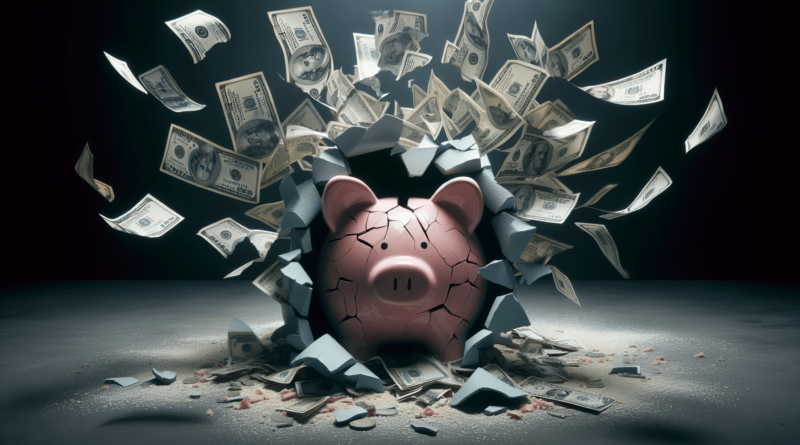PEOPLE ARE DEAD BROKE! Credit Debt and Delinquencies EXPLODING!
It’s no secret that credit card debt in the US is skyrocketing, reaching a staggering $1.17 trillion. The average balance carried by Americans has increased by 10% year over year, landing at an alarming $6360. Many individuals are struggling to pay off their debts due to high-interest rates, and credit card delinquencies have surged by 50% this year. Despite these distressing figures, there is ongoing debate about whether the country is actually in a recession. This video by Michael Bordenaro sheds light on the dire situation, offering 1-on-1 calls for advice and encouraging viewers to sign up for email updates. Additionally, Bordenaro promotes his filming and editing equipment and provides cash back on internet purchases. With the national debt surpassing $34 trillion, it is crucial to address these mounting debt issues and work towards creating a more sustainable and equitable economic system.
The Alarming State of Credit Debt
Record high credit card debt in the US
The United States is currently facing a shocking state of credit card debt. Recently, the total credit card debt in the country has reached a record high of $1.17 trillion. This staggering number is a cause for concern as it indicates that many Americans are struggling financially and relying heavily on credit cards to meet their day-to-day expenses. The increasing reliance on credit cards can lead to a cycle of debt and make it challenging for individuals to achieve financial stability.
Increasing average credit card balances
Not only is the total amount of credit card debt in the US at an all-time high, but the average balance that Americans carry on their credit cards has also been increasing. Year over year, the average credit card balance has risen by 10% to $6360. This means that the average American is carrying a substantial amount of debt on their credit cards, making it difficult for them to pay off their balances. With high-interest rates often associated with credit cards, individuals are trapped in a cycle of debt due to the mounting interest charges.
Burden of high-interest rates
One of the biggest challenges faced by individuals with credit card debt is the burden of high-interest rates. Most credit cards come with high-interest rates, often ranging from 20% to 25%. This means that even if individuals make minimum payments on their credit cards, a significant portion of their payment goes towards paying off the interest rather than the principal balance. As a result, it becomes challenging for individuals to make progress in paying off their credit card debt.
Debate on Recession
Debates on US recession
While the nation is grappling with record-high credit card debt, there is an ongoing debate about whether or not the US is in a recession. Some argue that the economic indicators, such as GDP growth and stock market performance, point to a robust economy. However, others contend that the financial struggles faced by the average American, as evidenced by the high levels of credit card debt and delinquencies, suggest an underlying recessionary environment.
Different viewpoints on the economic situation
The differing viewpoints about the US recession stem from the interpretation of economic data. Those who argue against the presence of a recession highlight positive GDP growth figures and a seemingly strong stock market as indicators of a healthy economy. On the other hand, those who believe a recession is imminent point to the record-high credit card debt, increasing delinquencies, and the struggles faced by individuals to make ends meet as evidence of an economic downturn. The debate on the US recession reflects the complexity of assessing the overall state of the economy and its impact on the everyday lives of Americans.

Debt Crisis in the US
Nation’s debt surpassing 34 trillion dollars
The United States is not only facing a crisis of credit card debt but also a broader debt crisis. Currently, the nation’s total debt has surpassed a staggering 34 trillion dollars. This staggering figure represents the accumulating debt burden on the country as a whole, including government debt, personal loans, mortgage debt, and more. The increasing debt levels can have significant implications for the country’s economic stability and the financial well-being of its citizens.
Record high average credit card balance
As part of the larger debt crisis, the average American’s credit card balance has also reached a record high. With an average balance of $636, individuals are carrying significant amounts of credit card debt, which can be difficult to manage and pay off. The rising credit card balances reflect the challenges faced by Americans in keeping up with their expenses and meeting their financial obligations.
Credit card debt surpassing 1 trillion dollars
In addition to the record-high average credit card balance, the total credit card debt in the US has surpassed an alarming 1 trillion dollars. This staggering amount of credit card debt is indicative of a larger problem of financial strain and reliance on credit cards as a source of funding. The high levels of credit card debt can have long-term consequences for individuals and the overall economy, hindering economic growth and perpetuating a cycle of debt.
Inflation and Rising Living Costs
Inflation contributing to increased debt
One of the factors contributing to the alarming state of credit debt in the US is inflation. Inflation refers to the increase in prices of goods and services over time. As prices rise, the purchasing power of individuals decreases, leading to a greater reliance on credit cards to meet their financial needs. The erosion of purchasing power due to inflation leads to increased debt as individuals struggle to keep up with the rising cost of living.
Rising cost of living making expenses difficult to manage
The rising cost of living exacerbates the burden of credit card debt. As expenses continue to increase, individuals find it challenging to meet their financial obligations and cover their day-to-day expenses. The combination of inflation and rising living costs creates a financial strain for individuals and contributes to the rising levels of credit card debt.

Surge in Credit Card Delinquencies
Increasing number of individuals falling behind on monthly payments
A concerning trend in the US is the surge in credit card delinquencies. This means that an increasing number of individuals are falling behind on their monthly credit card payments. The inability to make timely payments reflects the overwhelming financial challenges faced by many Americans and their struggle to manage their credit card debt.
Rise in credit card delinquencies
Credit card delinquencies have been on the rise, with delinquency rates increasing by 50% in 2023 alone. This sharp increase underscores the financial difficulties faced by individuals and their inability to keep up with their credit card payments. It is indicative of the strain on personal finances and the risk it poses to individuals’ credit scores and financial well-being.
Car Loan Delinquencies
Highest level since the Global Financial Crisis
Similar to credit card delinquencies, car loan delinquencies have reached their highest levels since the Global Financial Crisis (GFC). A recent report from the New York Fed reveals that 7.7% of car loan debt is currently 30 days late, the highest level since 2010. This concerning trend suggests that individuals are facing challenges in making their car loan payments, potentially due to rising car prices and higher interest rates.
Impact of car loan delinquencies on the economy
The surge in car loan delinquencies could have significant implications for the US economy. Defaults on car loans could lead to increased financial instability for lenders and the broader financial system. Additionally, the inability to make car loan payments can result in repossessions, negatively impacting individuals’ credit scores and limiting their access to credit in the future. The rise in car loan delinquencies is a reflection of the financial strain faced by many Americans and the potential risks it poses to the overall economy.

Growing Wealth Inequality
Alarming accumulation of wealth by the rich
One of the disturbing aspects of the current economic situation is the alarming accumulation of wealth by the rich. While many individuals struggle with debt and financial difficulties, a small percentage of the population continues to amass significant wealth. This growing wealth inequality highlights the disparities in access to resources and opportunities, exacerbating economic challenges faced by the rest of the population.
Economic struggles faced by the rest of the population
As wealth continues to concentrate in the hands of a few, the economic struggles faced by the rest of the population become more pronounced. Rising debt, increasing living costs, and limited access to resources contribute to financial hardships for many individuals and families. The growing wealth divide highlights the urgent need for equitable economic policies and a focus on addressing wealth inequality.
Taxing the Rich
Proposed solution to wealth inequality
Addressing wealth inequality has prompted discussions around taxing the rich. Many argue that implementing higher taxes on the wealthy can help redistribute wealth and provide resources to address societal needs such as education, healthcare, and infrastructure. By increasing taxes on the rich, it is believed that resources can be redirected to benefit the broader population and reduce the disparities in wealth and opportunity.
Concerns about the government’s ability to handle funds
While taxing the rich is proposed as a solution to wealth inequality, concerns exist regarding the government’s ability to handle funds effectively. Skepticism arises from questions about how efficiently tax revenue would be allocated and whether it would truly address the root causes of wealth inequality. There is a need for transparency, accountability, and responsible management of funds to ensure that tax initiatives have the intended impact in reducing wealth inequality.

Global Inequality and Its Consequences
Highest global inequality since World War II
Wealth inequality is not limited to the United States; it is a global issue. Currently, global inequality is at its highest level since World War II. The concentration of wealth in the hands of a few individuals and countries has significant implications for global economic stability and social well-being. The persistence of global inequality exacerbates the challenges faced by poorer countries and undermines efforts to achieve sustainable development and eliminate poverty.
Poorer countries facing bankruptcy
The consequences of global inequality are especially severe for poorer countries. As wealth continues to accumulate in the hands of a few wealthy nations, poorer countries face the risk of bankruptcy and financial instability. Limited access to resources, opportunities, and favorable trade agreements place these countries at a disadvantage, perpetuating a cycle of poverty and underdevelopment.
Disproportionate tax burdens on the wealthy
Another consequence of global inequality is the disproportionately high tax burdens placed on the wealthy compared to the rest of the population. In many cases, the wealthy are able to exploit tax loopholes and offshore accounts, minimizing their tax obligations. This not only deepens wealth inequality but also reduces the amount of revenue available for public goods and services, further exacerbating the economic challenges faced by those in need.
The Need for a Sustainable and Equitable System
Current economic situation highlights the need for change
The current state of credit debt, rising living costs, and wealth inequality underscores the urgent need for a more sustainable and equitable economic system. The existing system perpetuates financial hardships for individuals, especially those burdened with debt, while allowing wealth accumulation for a select few. To address these systemic issues, it is necessary to reevaluate economic policies, implement measures to reduce debt burdens, and create opportunities for broader wealth distribution.
Importance of a sustainable and equitable economic system
A sustainable and equitable economic system is crucial for ensuring the well-being and prosperity of individuals and society as a whole. Such a system should prioritize fair wealth distribution, access to resources, and opportunities for all. By addressing the root causes of financial hardships, debt burdens, and wealth inequality, a more sustainable and equitable economic system can create a foundation for long-term economic stability, social progress, and improved quality of life. It is imperative that policymakers, governments, and individuals work together to achieve this vision of a just and inclusive economy.
In conclusion, the alarming state of credit debt, the ongoing debate on recession, the debt crisis in the US, inflation and rising living costs, the surge in credit card and car loan delinquencies, growing wealth inequality, discussions on taxing the rich, global inequality, and the need for a sustainable and equitable economic system collectively paint a challenging economic landscape. The complexity of these issues requires thoughtful consideration and comprehensive solutions to ensure financial security, social equality, and long-term economic prosperity for all.


